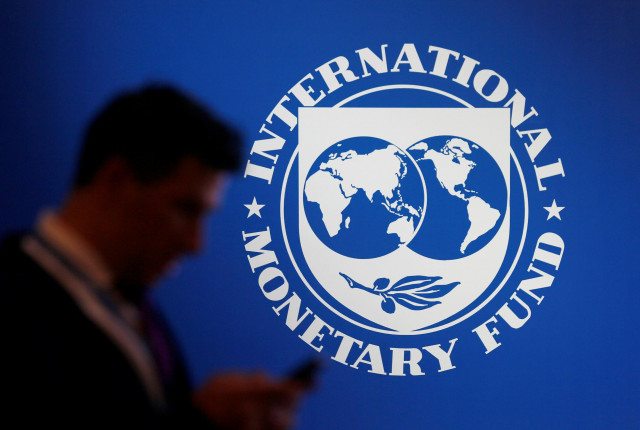IMF requests Pakistan's parliament to help increase SBP’s autonomy
Calls for legal amendments for automatically increasing electricity prices

PHOTO: REUTERS
The IMF Mission Chief to Pakistan, Ernesto Rigo, requested a joint sitting of the National Assembly and Senate’s standing committees on Finance and Revenue to support the amendments to be proposed in the National Electric Power Regulatory Authority (Nepra) Act and the State Bank of Pakistan Act.
The meeting was held in-camera but later on, the members briefed the media.
An IMF mission is in town for review of Pakistan’s economic performance during the July-September period. The successful completion, likely today, would pave the way for approval of the second loan tranche of nearly $460 by the IMF Executive Board next month.
To a question, Rigo told parliamentarians that the Financial Action Task Force (FATF) was not a direct concern of the IMF but deficient terror financing and money laundering frameworks may carry implications for foreign private inflows that are critical for programme implementation.
The majority of the members of both the standing committees did not go beyond the issues that were results of either the IMF stabilization programme or were general in nature, a committee member told The Express Tribune.
Under the conditions of the $6 billion IMF deal, the Pakistan Tahreek-e-Insaf (PTI) government is bound to submit the amended bills to parliament by December this year.
The PTI lacks the simple majority in the Senate and is also not ready to take the opposition parties on board on important national and economic matters. Because of these reasons, the PTI government has promulgated nearly 24 presidential ordinances, undermining the democratic and parliamentary system.
During discussions, Rigo requested the parliament’s support to amend the Nepra and SBP laws.
The amendments to Nepra Act will be submitted to parliament by end-December 2019 with a view to ensuring full automaticity of the quarterly tariff adjustments and eliminating the gap between the regular annual tariff determination by the regulator and the notification by the government, according to the IMF’s staff level report.
Pakistan Muslim League-Nawaz’s (PML-N) Ali Pervaiz suggested the IMF look into the issues of cross-subsidization of electricity. He suggested that the federal government should hand over the power distribution companies to provinces to end uniformed tariffs and to encourage efficiency gains.
Pervaiz also highlighted the issue of outstanding Rs283 billion worth of receivables against the agriculture tube-well consumers. The successive governments provided subsidised electricity to farmers but did not fully fund these incentives.
The IMF mission also sought the parliament’s support to approve amendments in the SBP law. The proposed measures are aimed at strengthening the SBP autonomy and eliminating the central bank financing of budget deficit to enable the SBP to deliver on its mandate of price and financial stability.
The SBP Act will be amended to strengthen the SBP’s autonomy, governance, and mandate, according to the IMF report. The amendments will ensure price stability as the SBP’s primary objective and prohibit any form of direct credit to the government.
After the IMF Mission chief claimed that the programme was successfully moving forward, the PML-N’s Dr Ayesha Pasha urged the IMF to soften the programme targets.
Rigo responded that the programme document was ‘evolutionary’. The members were of the view that the IMF did not appear inclined to relax targets.
Pakistan has requested the IMF to relax the restrictions imposed on creating domestic base money and cut the Federal Board of Revenue’s (FBR) revenue target.
Secretary Finance Naveed Kamran Baloch told the joint sitting that any changes in the budgetary targets will be made during the mid-term budget review that would take place in February next year.
The IMF mission chief also said on one hand some sectors of the economy are not paying due shares of taxes and on the other hand, incentives are also given to such sectors. The PTI government has recently given sweeping tax concessions to the traders despite their negligible contribution to taxes.
“The success story that the IMF painted in the meeting appeared to be the result of the jugglery of figures, said Sherry Rehman of Pakistan Peoples Party (PPP) while talking to press after the meeting. “Steep adjustments under the programme are leading to an increase in destitution in Pakistan,” she added.
She said one should not expect from the IMF that it would declare the implementation of the programme unsatisfactory at this state.
“It is the first programme in the history of Pakistan in which a federal government has thrown its responsibilities on the shoulder of the IMF and compromised on the interests of the people.”
Chairman of the Senate Standing Committee on Finance Farooq H Naeek said he raised the issue of integration of the General Sales Tax on goods and services. “If the IMF pressed the issue of centralizing the GST on services collection, this will be a violation of the Constitution,” he said.
He said the government’s focus on containing the current account deficit has affected the revenue growth and economic productivity.
The NA Standing Committee on Finance Chairman Asad Umar said meeting with the IMF was productive and that the committee members did not give any formal proposal to the IMF.



















COMMENTS
Comments are moderated and generally will be posted if they are on-topic and not abusive.
For more information, please see our Comments FAQ